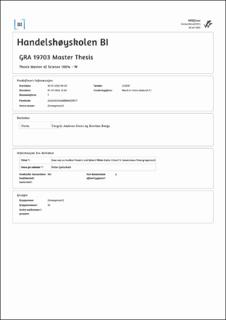| dc.description.abstract | White-collar crime has risen dramatically over the last decades and is only
expected to become more frequent. Not until recently has white-collar crime
become a recognized and widely discussed problem. With the emergence of
Norway as one of the world’s richest nations and increasing pressure from
international markets, demands and expectations, white-collar crime has become a
widely discussed and recognized problem.
White-collar crime is harder to ‘see’ than other crimes as it is more
difficult to observe, it is also more difficult to detect and especially prevent.
As the topic of white-collar crime receives abundant research, this thesis
aims to add knowledge and understanding in how the external auditor prevents
and detects white-collar crime and disturbs aspects of the convenience theory.
This thesis will answer a few other research questions which will
collectively answer the following question “How can an auditor prevent and
detect white-collar crime? A convenience theory approach”:
1. What is the responsibility of an auditor in the prevention and detection of
White-Collar Crime?
2. How can an auditor prevent and detect white-collar crime?
3. How can an auditor remove motive, opportunity, and willingness to
commit white-collar crime?
By reviewing existing research literature and conducting interviews with
several highly experienced employees and experts across 5 different industries
and roles, this thesis will highlight specific measures believed to be answers to the
research question.
Main findings include 11 specific requirements and actions that disturb 6
aspects of crime convenience. Some of these are: maintaining professional
skepticism, requiring sufficient client funding, spending enough time during the
audit, understanding the client business, ignoring the potential superstar CEO, and
working with the board of directors. The topic of audit team rotation, or turnover,
is further discussed as the results of existing resear | en_US |
